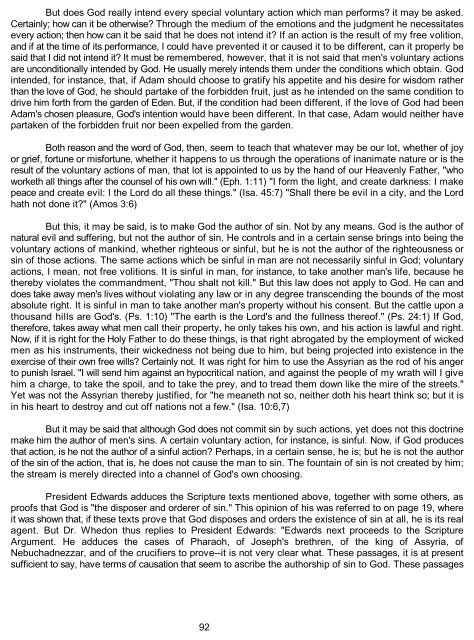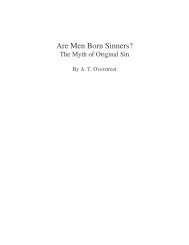Foreknowledge by Joel Hayes - Library of Theology
Foreknowledge by Joel Hayes - Library of Theology
Foreknowledge by Joel Hayes - Library of Theology
You also want an ePaper? Increase the reach of your titles
YUMPU automatically turns print PDFs into web optimized ePapers that Google loves.
But does God really intend every special voluntary action which man performs? it may be asked.<br />
Certainly; how can it be otherwise? Through the medium <strong>of</strong> the emotions and the judgment he necessitates<br />
every action; then how can it be said that he does not intend it? If an action is the result <strong>of</strong> my free volition,<br />
and if at the time <strong>of</strong> its performance, I could have prevented it or caused it to be different, can it properly be<br />
said that I did not intend it? It must be remembered, however, that it is not said that men's voluntary actions<br />
are unconditionally intended <strong>by</strong> God. He usually merely intends them under the conditions which obtain. God<br />
intended, for instance, that, if Adam should choose to gratify his appetite and his desire for wisdom rather<br />
than the love <strong>of</strong> God, he should partake <strong>of</strong> the forbidden fruit, just as he intended on the same condition to<br />
drive him forth from the garden <strong>of</strong> Eden. But, if the condition had been different, if the love <strong>of</strong> God had been<br />
Adam's chosen pleasure, God's intention would have been different. In that case, Adam would neither have<br />
partaken <strong>of</strong> the forbidden fruit nor been expelled from the garden.<br />
Both reason and the word <strong>of</strong> God, then, seem to teach that whatever may be our lot, whether <strong>of</strong> joy<br />
or grief, fortune or misfortune, whether it happens to us through the operations <strong>of</strong> inanimate nature or is the<br />
result <strong>of</strong> the voluntary actions <strong>of</strong> man, that lot is appointed to us <strong>by</strong> the hand <strong>of</strong> our Heavenly Father, "who<br />
worketh all things after the counsel <strong>of</strong> his own will." (Eph. 1:11) "I form the light, and create darkness: I make<br />
peace and create evil: I the Lord do all these things." (Isa. 45:7) "Shall there be evil in a city, and the Lord<br />
hath not done it?" (Amos 3:6)<br />
But this, it may be said, is to make God the author <strong>of</strong> sin. Not <strong>by</strong> any means. God is the author <strong>of</strong><br />
natural evil and suffering, but not the author <strong>of</strong> sin. He controls and in a certain sense brings into being the<br />
voluntary actions <strong>of</strong> mankind, whether righteous or sinful, but he is not the author <strong>of</strong> the righteousness or<br />
sin <strong>of</strong> those actions. The same actions which be sinful in man are not necessarily sinful in God; voluntary<br />
actions, I mean, not free volitions. It is sinful in man, for instance, to take another man's life, because he<br />
there<strong>by</strong> violates the commandment, "Thou shalt not kill." But this law does not apply to God. He can and<br />
does take away men's lives without violating any law or in any degree transcending the bounds <strong>of</strong> the most<br />
absolute right. It is sinful in man to take another man's property without his consent. But the cattle upon a<br />
thousand hills are God's. (Ps. 1:10) "The earth is the Lord's and the fullness there<strong>of</strong>." (Ps. 24:1) If God,<br />
therefore, takes away what men call their property, he only takes his own, and his action is lawful and right.<br />
Now, if it is right for the Holy Father to do these things, is that right abrogated <strong>by</strong> the employment <strong>of</strong> wicked<br />
men as his instruments, their wickedness not being due to him, but being projected into existence in the<br />
exercise <strong>of</strong> their own free wills? Certainly not. It was right for him to use the Assyrian as the rod <strong>of</strong> his anger<br />
to punish Israel. "I will send him against an hypocritical nation, and against the people <strong>of</strong> my wrath will I give<br />
him a charge, to take the spoil, and to take the prey, and to tread them down like the mire <strong>of</strong> the streets."<br />
Yet was not the Assyrian there<strong>by</strong> justified, for "he meaneth not so, neither doth his heart think so; but it is<br />
in his heart to destroy and cut <strong>of</strong>f nations not a few." (Isa. 10:6,7)<br />
But it may be said that although God does not commit sin <strong>by</strong> such actions, yet does not this doctrine<br />
make him the author <strong>of</strong> men's sins. A certain voluntary action, for instance, is sinful. Now, if God produces<br />
that action, is he not the author <strong>of</strong> a sinful action? Perhaps, in a certain sense, he is; but he is not the author<br />
<strong>of</strong> the sin <strong>of</strong> the action, that is, he does not cause the man to sin. The fountain <strong>of</strong> sin is not created <strong>by</strong> him;<br />
the stream is merely directed into a channel <strong>of</strong> God's own choosing.<br />
President Edwards adduces the Scripture texts mentioned above, together with some others, as<br />
pro<strong>of</strong>s that God is "the disposer and orderer <strong>of</strong> sin." This opinion <strong>of</strong> his was referred to on page 19, where<br />
it was shown that, if these texts prove that God disposes and orders the existence <strong>of</strong> sin at all, he is its real<br />
agent. But Dr. Whedon thus replies to President Edwards: "Edwards next proceeds to the Scripture<br />
Argument. He adduces the cases <strong>of</strong> Pharaoh, <strong>of</strong> Joseph's brethren, <strong>of</strong> the king <strong>of</strong> Assyria, <strong>of</strong><br />
Nebuchadnezzar, and <strong>of</strong> the crucifiers to prove--it is not very clear what. These passages, it is at present<br />
sufficient to say, have terms <strong>of</strong> causation that seem to ascribe the authorship <strong>of</strong> sin to God. These passages<br />
92






